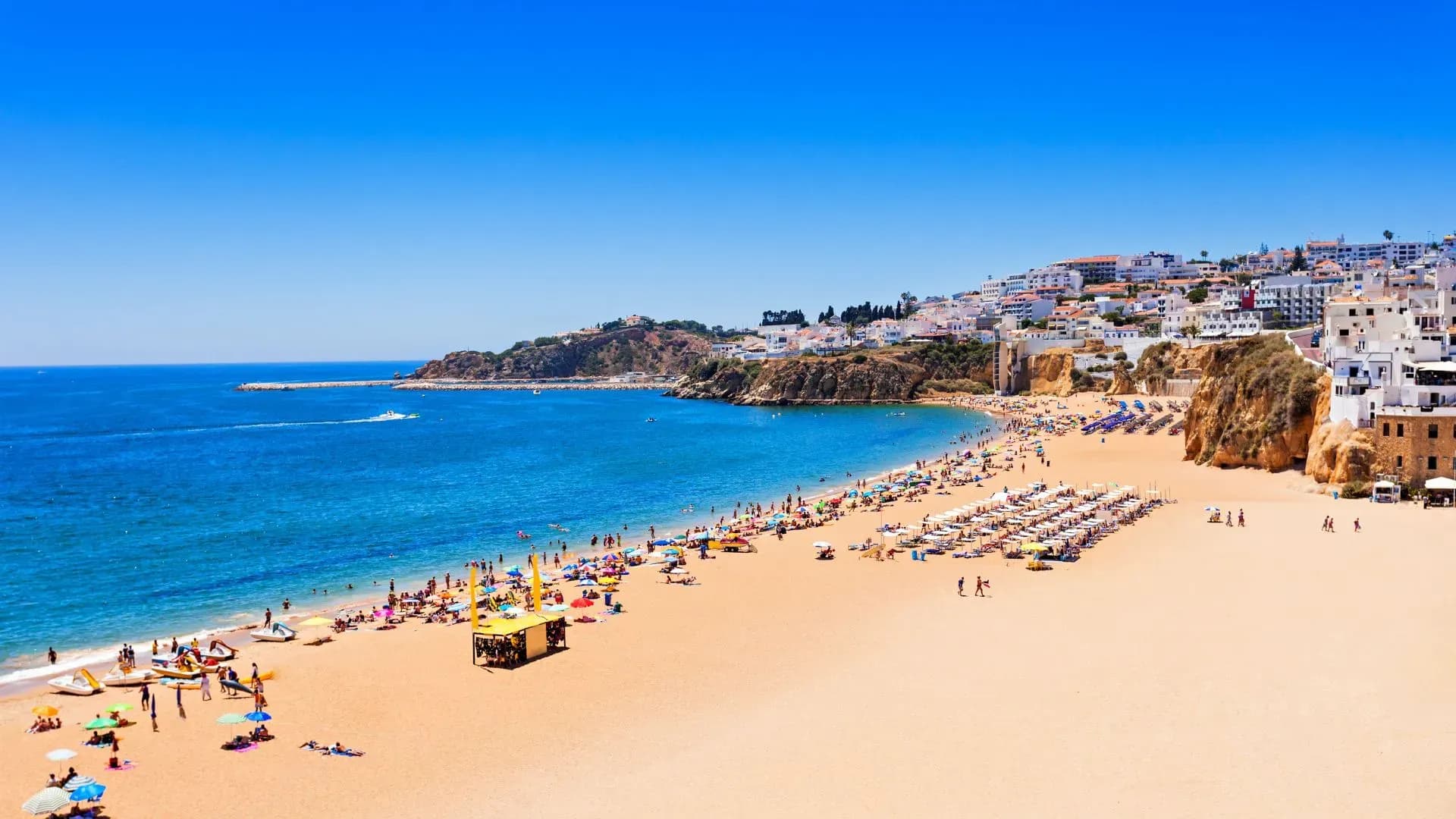Planning a Move?
Let's Stay in Touch. Sign up for Touchdown Highlights
About
Services
Consultations
Knowledge Hub
Contact
Knowledge Hub
Renting in Portugal
Published
October 2
2025
Cost of Living
Reviewed by Experts

Published
October 2
2025
When moving to Portugal, renting is often the most practical first step, especially since buying property can feel like too big a commitment at the start. The country’s sunny climate, vibrant digital-nomad scene, and appealing cost of living have turned its rental market into one of the most desirable in Europe.
Renting provides flexibility, allowing newcomers to explore neighborhoods and adjust before deciding where to settle long term.
If you’re still exploring the best places to live in Portugal, learning about renting in Portugal can help you feel more confident in your decision. This article walks you through rental prices in different cities of Portugal, along with tenant rights, contracts, and legal support so you can avoid common pitfalls.
Portugal’s rental market has been on a steady upward climb in recent years. In December 2023, the average price per square meter of rental housing was €15.5, rising to €16.7 by July 2026. Lisbon remains the most expensive, reaching €19.6 per square meter, while Porto, Faro, and other mid-sized cities remain more affordable.
In practical terms, a one-bedroom apartment in central Lisbon typically costs between €1,200 and €1,500 per month, compared with €800 to €1,000 in Porto or Faro. Villas and larger houses, especially in suburban or coastal areas, tend to come at higher prices and are often in demand for short-term stays. Compared to cities like New York or San Francisco, where similar rentals average $2,800–$3,500, Portugal continues to offer far better value for money.
Portugal’s rental landscape varies widely depending on where you choose to live. Larger cities like Lisbon and Porto come with higher prices but vibrant cultural and professional opportunities, while coastal towns and inland regions offer more space and affordability.
Here are the most popular destinations for renters, starting with the capital.

Source: TripAdvisor
Renting in Lisbon means living in one of Europe’s most dynamic capitals. From historic neighborhoods like Alfama and Bairro Alto to modern areas such as Parque das Nações, the city combines tradition with a contemporary lifestyle.
Lisbon is also known for being one of the most LGBTQ-friendly cities in Europe, with vibrant nightlife around Príncipe Real and regular Pride events that make newcomers feel welcome.
Average rental prices in Lisbon:
Lisbon is Portugal’s most expensive rental market, averaging just over €19 per square meter, but its lively atmosphere and inclusive culture often justify the higher costs.

Source: Business Standard
Porto, Portugal’s second-largest city, is known for its character, rich history, and dramatic setting along the Douro River. While Lisbon often takes the spotlight, Porto appeals to those who want a slower pace without losing access to cultural life.
Porto is also recognized for its welcoming LGBTQ-friendly spaces, with a growing number of inclusive bars and cultural venues.
Average rental prices in Porto:
Rental prices here are noticeably lower than in Lisbon, but residents still enjoy excellent amenities, a strong creative scene, and a lifestyle shaped by the city’s mix of tradition and modernity.

Source: Wikivoyage
Braga, often called the “Rome of Portugal” for its abundance of historic churches, combines a strong cultural heritage with the feel of a modern university city. It’s popular among families and younger professionals who want a quieter lifestyle than Lisbon or Porto but still value good infrastructure, schools, and transport connections.
The city has a growing technology sector, affordable living costs, and a welcoming atmosphere for expats.
Average rental prices in Braga:
Rental prices in Braga are significantly lower than in Lisbon and Porto, making it a cost-effective choice without giving up on culture, lively student life, or access to northern Portugal’s scenic countryside.

Source: WTTC
The Algarve, Portugal’s southernmost region, is best known for its golden beaches, dramatic cliffs, and sunny climate that lasts most of the year. Popular with retirees, digital nomads, and holidaymakers, the area balances resort living with traditional Portuguese towns like Lagos, Tavira, and Faro.
Average rental prices in the Algarve:
While the Algarve is more affordable than Lisbon in terms of housing, prices can fluctuate depending on proximity to the coast and seasonal demand.
Many furnished apartments are marketed toward short-term stays, so long-term renters should plan ahead and secure leases early.
Not every renter is looking for the bustle of Lisbon or Porto, or the resort lifestyle of the Algarve. There are other regions in Portugal that provide attractive rental options that combine affordability with unique local character.
Apartments are the most common rental option in Portugal, ranging from compact studios to spacious T4s (four-bedroom units). Listings often use the “T” system, where T1 means one bedroom, T2 means two, and so on.
In Lisbon and Porto, many renters share apartments to reduce costs, while standalone houses are more common in suburbs and smaller towns. Properties can be furnished or unfurnished, usually with equipped kitchens, though items like washing machines are not always included.
Renting in Portugal follows a simple process, but competition can be high, especially in Lisbon, Porto, and the Algarve.
You can either work with a rental agency that guides you through the paperwork or deal directly with a private landlord. In both cases, you’ll need a Portuguese tax number (NIF), proof of ID, and financial documents such as bank statements or proof of employment. Be prepared to pay upfront costs, usually around three months’ rent plus a security deposit.
Touchdown can also help you secure your NIF and open a Portuguese bank account, both of which are essential steps before signing a lease.
Houses are more common in suburban areas, smaller towns, and rural regions. Families and long-term residents often prefer this option for extra space and privacy.
To rent a house, you’ll typically need to provide your NIF, identity documents, and proof of income. Some landlords may also request a guarantor (fiador), especially if you’re a student or self-employed.
Agency support can be useful when renting a house, as properties are less frequently advertised online compared to apartments.
Apartments dominate the rental market, particularly in Lisbon, Porto, and coastal cities. The process of renting an apartment is similar to houses but often more competitive, so it’s important to act quickly when you find a place.
Apartments are commonly listed through online portals and agencies, with options ranging from studios to multi-bedroom units. Furnished apartments are easy to find in city centres, while unfurnished options are more common for long-term leases. Expect to sign a written contract and pay advance rent along with a deposit before moving in.
Tip: It’s always a good idea to have your rental contract reviewed by a legal expert. Touchdown’s team can check the details for you to ensure your rights as a tenant are fully protected.
Finding the right rental in Portugal takes a bit of research, but there are a few tried-and-true places to start your search.
A licensed agent can save you time by matching you with properties that fit your budget and lifestyle. They’ll also handle viewings, paperwork, and negotiations. While you’ll pay a fee for their services, the process is smoother, especially since many agents in larger cities speak English.
Digital platforms such as Idealista, OLX, and Imovirtual are widely used across Portugal. These allow you to filter by price, size, and location, but you’ll often need to liaise directly with landlords. In smaller towns, having some Portuguese language skills will make communication easier.
Sharing a flat is popular with students and young professionals, especially in Lisbon and Porto where prices are higher. Co-living spaces are an emerging trend that combines affordability with community living.
Here are a few popular coliving options:
Lisbon
Porto
Understanding your rights and obligations as a tenant is crucial before signing a lease in Portugal. Tenancy contracts, known as contrato de arrendamento, are legally binding documents that outline the responsibilities of both tenant and landlord.
Rental contracts can be either fixed-term (contrato com prazo certo) or open-ended (contrato por duração indeterminada). Most agreements run for at least one year and renew automatically unless either party decides to terminate.
A standard contract should clearly state the names and IDs of all parties, property details, rental amount, payment deadlines, and contract duration.
If you decide to move out, you must give at least two months’ notice. Landlords face stricter requirements and typically can only terminate a lease with cause, such as needing the property for personal use or undertaking major renovations.
Rental law in Portugal is designed to protect tenants, but contracts can still include clauses that may not work in your favor. Touchdown’s legal team can review your lease before you sign, ensuring your rights are safeguarded from day one.
Even with tenant-friendly laws, disputes between renters and landlords can happen. Portugal provides several resources to help tenants understand their rights and find fair solutions.
Beyond the monthly rent, tenants should plan for several additional expenses when budgeting for life in Portugal.
Renting in Portugal comes with a few key steps that can make your experience smoother and protect you legally.
Use this checklist to stay on track:
Portugal has become a top choice for expats and remote workers, but there are a few factors to weigh up before committing to a rental.
Touchdown is Portugal’s premier relocation platform. With a dedicated team of legal experts, we take the complexity out of moving abroad by offering all the services you need to settle and succeed in your new home, through one intuitive platform.
Every relocation story is different. That’s why, whether you’re moving on your own or with your family, Touchdown builds a plan tailored to your specific goals and circumstances. Our free Eligibility Checker quickly outlines your options, while our in-house lawyers and step-by-step platform give you full clarity and guidance at every stage.
For example, our legal team guides you through key steps like securing your NIF and bank account, reviewing your rental contract, and ensuring you meet all local requirements.
From managing visa applications to optimizing your tax setup and supporting you after arrival, Touchdown turns complicated immigration processes into a seamless and stress-free journey.
You can book a 1:1 consultation with our experts for tailored advice today.
Rental costs vary by location. In Lisbon, a one-bedroom in the city centre averages around €1,400, while in Porto it’s closer to €1,000. Smaller cities like Braga or inland towns can be much cheaper, often between €500–€900 for similar apartments.
Yes. Foreigners can rent houses and apartments in Portugal with no restrictions. You’ll need a NIF (tax number), proof of ID, and financial documents to sign a lease.
It depends on the region. In Lisbon or Cascais, $1,500 may be tight, but in cities like Braga, Coimbra, or smaller towns, it’s possible to cover rent, utilities, and daily expenses with that budget.
Absolutely. Americans can rent like any other foreign national. Long-term rentals may also be used as proof of accommodation for visas such as the D7 or D8.
You can seek help from tenant associations like the Associação dos Inquilinos e Condóminos do Norte de Portugal, or hire a real estate lawyer. Touchdown offers in-house legal support to review rental contracts and protect your rights.
Popular platforms include Idealista, OLX, and Imovirtual, which list both furnished and unfurnished properties. For expats, working with a trusted agency or relocation service like Touchdown ensures you access vetted listings and avoid scams.

Author Bio
Henrique Moreira de Sousa
Henrique leads Immigration at Touchdown. Henrique is a Portuguese Lawyer and immigration law specialist that has overseen the relocation of hundreds of expats to Portugal.
Related Articles
Related Articles
Let's Stay in Touch. Sign up for Touchdown Highlights
